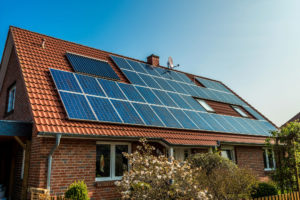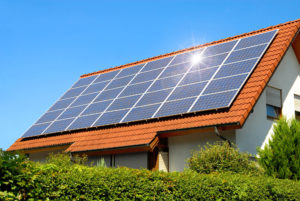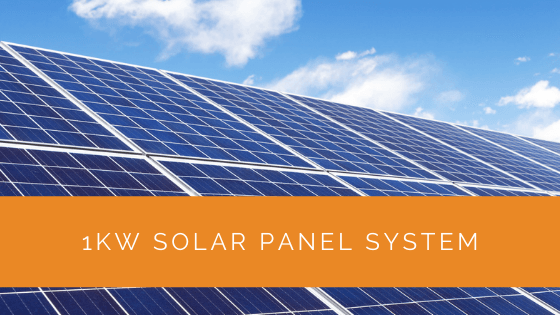If you’re considering harnessing the sun’s power to generate electricity for your home, it’s crucial to understand the ins and outs of a 1kW solar panel system. This comprehensive guide will explore how much electricity a 1kW solar panel produces, the potential for energy storage, the number of panels needed, and various considerations before installation. Whether you’re a beginner exploring the world of solar energy or looking to upgrade your existing system, this article will provide valuable insights to make informed decisions about your energy needs.
A 1kW solar panel system may sound appealing, but weighing its advantages and disadvantages is essential, especially when compared to larger systems. We’ll delve into cost, efficiency, and how much electricity you can expect to generate. Additionally, we’ll explore options for storing excess energy, the importance of proper maintenance, and the potential for financial benefits through programs like the Smart Export Guarantee (SEG). By the end of this article, you’ll understand whether a 1kW solar panel system is the right choice for your energy needs and how to navigate the world of solar installations effectively.
Contents
- 1 Key Takeaways
- 2 How Much Electricity Does A 1KW Solar Panel Produce?
- 3 Can You Store the Electricity Generated By Solar Panel System?
- 4 How Many Solar Panels Do You Need to Install?
- 5 Can You Install Solar Panels on A Flat Roof?
- 6 A Few Things You Need To Aware Before Installing Solar PV System
- 7 How To Earn Money from Solar Panels?
- 8 How To Calculate Energy Output Of Solar Panel System?
- 9 Factors Affecting Output of Solar Panel System
- 10 How To Check the Functioning of Solar Panels Installed
- 11 How Much Does It Cost to Install 1kW Solar Panels?
- 12 Other Solar Panel System Sizes
- 13 Discover the Power of Solar with Solar Panels Network
- 14 Summing Up
Key Takeaways
- Solar power has become the cheapest source of electricity, leading to a surge in residential solar panel adoption in the UK.
- A 1 kW solar panel system generates about 750-850 kWh annually, but it may not meet the energy demands of the average UK household, making larger systems more practical.
- Considerations for solar panel installation include the need for planning permission, energy performance certificates, and the option to earn money through the Smart Export Guarantee (SEG).
How Much Electricity Does A 1KW Solar Panel Produce?
1 kW solar panels produce about 750 to 850 kWh of electricity annually, while 4 kW solar panels produce around 2,850 kWh annually.
The 1 kW solar panel system comes in many individual solar panels. You’ll need to combine several solar panels, say seven panels, each 200 watts, which will produce the desired output when combined.
Then again, this, too, might not be enough as I kW generates enough power to meet a percentage of your needs. Furthermore, the 1 kW system doesn’t offer decent savings in the long term. Therefore, investing in plug-in solar kits might be better than a 1 kW solar power system.
Can You Store the Electricity Generated By Solar Panel System?
 You can store the electricity generated by the solar panel system using solar batteries. A solar battery stores solar energy from the panel and acts as an energy bank for grey days and after dark.
You can store the electricity generated by the solar panel system using solar batteries. A solar battery stores solar energy from the panel and acts as an energy bank for grey days and after dark.
Although the costs of battery storage devices are decreasing, they are still a bit expensive in the United Kingdom.
Installing solar panels without battery storage isn’t advisable as you’ll still depend on the National Grid for your electricity supply. This is because you’ll still need to subscribe to electricity for your energy needs at night.
How Many Solar Panels Do You Need to Install?
Your electricity bills are pivotal in estimating how many solar panels you need to install to meet your energy needs. You can also use a solar guide PV calculator to calculate the required panels.
However, the efficiency of solar PV panels varies depending on their size and brand. Therefore, consulting an expert in such cases is a better option.
Local solar installers give accurate estimates and recommendations for solar panel installation. They also sometimes offer free solar panel quotes when you hire their consultation services.
Can You Install Solar Panels on A Flat Roof?
You can install solar panels on a flat roof. Flat roofs are low-slope roofs with a minimum slope to accommodate a solar panel system.
You can also install solar thermal systems on your roof to warm your home during winter. Solar thermal panel installation is similar to a PV system and can be installed on a flat roof via a mounting track.
A Few Things You Need To Aware Before Installing Solar PV System
Solar panels offer a range of benefits, but they have their limitations. So, if you’re considering installing them, keep a few things in mind.
Planning Permission
Even though solar panels are labelled ‘permitted development’, all domestic properties must acquire ‘planning permission’ for installation projects.
Energy Performance Certificate
Lastly, an Energy Performance Certificate (EPC) is a must.
An EPC displays energy efficiency, with ‘A’ being the most efficient and ‘G’ the least. You can get this certification via any accredited energy-assessing agency.
MCS Certification
An MCS certificate is proof that all the equipment that has been designed and installed are MCS-certified products. You must ensure that your solar system is MCS certified as they are of the highest quality. MCS-accredited installers directly issue this certificate to the consumer.
Note: An MCS certificate is not a mandatory or legal requirement for solar system installation.
How To Earn Money from Solar Panels?
 The Smart Export Guarantee (SEG) allows you to earn money for the energy generated by the solar PV system. However, the size of the system must be smaller than 5MW.
The Smart Export Guarantee (SEG) allows you to earn money for the energy generated by the solar PV system. However, the size of the system must be smaller than 5MW.
In addition to saving money on energy bills, installing solar panels adds value to the property. Solar panels require little maintenance and generate free electricity, lowering energy bills.
How To Calculate Energy Output Of Solar Panel System?
Solar panels come with a meter that records the amount of electricity the system produces. It also displays how much electricity the panels export to the National Grid.
You can also access the performance levels of your solar panels through the manufacturer’s app or their website.
Factors Affecting Output of Solar Panel System
The efficient functioning of solar panels depends on a few factors. Even installing a 1kW solar system, you need to consider these factors.
Local Climate
Electricity generation highly depends on the local climate of the region. Solar panels require full sun exposure to convert solar energy to electricity for utility. Furthermore, the panels should not be in the shade as it hinders their charging capacity.
Roof Direction and Angle
Roof direction and angle are essential for the efficient functioning of solar panels. Your roof must be south-facing, without shading and at an angle of 35 degrees for optimum solar system performance.
Accumulation Of Dust and Debris
Dust and debris accumulate quickly on solar panels, which might be a considerable challenge. Solar panels can work effectively and efficiently for 25 years if they don’t gather dust.
This can cut its efficient lifespan in half if the accumulation of dust and debris is not prevented.
How To Check the Functioning of Solar Panels Installed
Your solar panels are connected to a wireless control panel, in-home display. This device monitors whether your system generates as much electricity as it should.
Contact the installer or manufacturer if you’re concerned that your solar panels are underperforming. However, please don’t tamper with the solar panels, which can damage the system and compromise the equipment warranty.
How Much Does It Cost to Install 1kW Solar Panels?
Usually, a 1 kW solar panel system can cost around £1,500 to £2,000 with installation and £1,500 and £3,000 without installation.
As the solar panel size increases, the price per watt decreases. As such, 1kW is not very popular among consumers. These solar panels cost more and generate less electricity.
Therefore, you must look into higher-rated systems for better returns. Although the upright cost is higher than the 1kW system, they offer better savings in the long run.
Other Solar Panel System Sizes
- 2kW Solar Panel System
- 3kW Solar Panel System
- 4kW Solar Panel System
- 5kW Solar Panel System
- 6kW Solar Panel System
- 12kW Solar Panel System
Discover the Power of Solar with Solar Panels Network
Are you navigating the world of solar installations? Look no further than Solar Panels Network, the UK’s trusted partner in harnessing the sun’s potential. Our dedication goes beyond just installations; we’re on a mission to transform how homeowners and businesses across the UK perceive and utilise energy. By choosing us, you’re reducing your carbon footprint and making a smart financial move that promises savings for years ahead. Contact us today and embark on your solar journey.
Summing Up
1 kW has more disadvantages than benefits to offer. Furthermore, most households need a more than 1 kW solar system to offset their electricity bill completely.
Even if a 1kW solar system is sufficient for your current consumption and needs, the same cannot be said for the future. Therefore, increasing your solar system size is advisable to accommodate all future needs.
About the Author
Solar Panels Network stands at the forefront of solar energy solutions, driven by a team of seasoned solar engineers and energy consultants. With over decades of experience in delivering high-quality solar installations and maintenance, we are committed to promoting sustainable energy through customer-centric, tailored solutions. Our articles reflect this commitment, crafted collaboratively by experts to provide accurate, up-to-date insights into solar technology, ensuring our readers are well-informed and empowered in their solar energy decisions.

